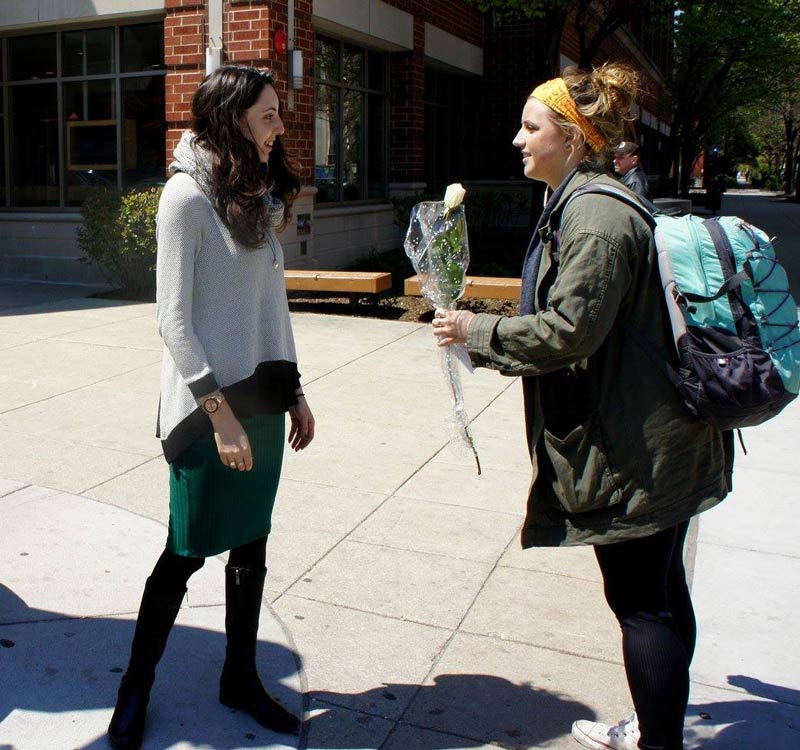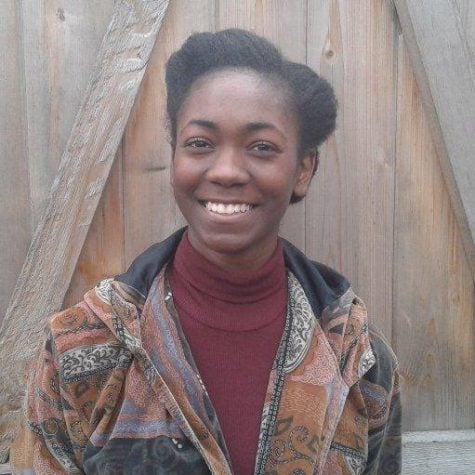
Born into a middle class Jewish family in Germany during World War II, Adina Sella’s youth was defined by survival. She felt the depths of restrictions placed on the Jews in Germany, and had to take on a new culture and identity with her family in order to escape.
It meant she needed “to steal, to hide, to mistrust, to lie, to steal food in my pocket,” she said. Its impact is why she prefers the term “child of the Holocaust” over survivor.
Sella told her story May 4, Holocaust Remembrance Day, to bring light to genocide and those affected by global atrocities. The event was organized by the Center for Jewish Law and Judaic Studies, and included a screening of the honorary documentary “The Search for the White Rose,” and speakers including the creator and director of the film and Sella. The event took place at the Sullivan Athletic Center in the Hall of Fame Foyer.
Holocaust Remembrance Day, or Yom HaShoah, was established after World War II as a commemoration of the survivors as well as the nearly 6 million who were killed by the Nazi regime.
Rabbi Steven Resnicoff, professor of law and director of DePaul’s College of Law Center of Jewish Law and Judaic Studies, started off the event with a benediction. The piece was originally written by his older brother Naval Chaplain Arnold Resnicoff.
“So from the Holocaust we learned when you deny humanity in others, we destroy the humanity within ourselves,” Resnicoff read. “When we reject the human and the holy in any neighbor’s soul, then we unleash the beast and the barbaric in our own heart.”
“The Search for the White Rose” was a film created and directed by independent filmmaker Peter Logue. The 25-minute film honors the members of the White Rose, a non-violent resistance movement which aimed to awaken the German people by writing informative anti-Nazi leaflets and urging Germans to rise up against Hitler’s regime. The group was made up of five Christian students who attended University of Munich at the time: Hans Scholl, Christoph Probst, Willi Graf, Sophie Scholl and Alexander Schmorell, along with professor Kurt Huber.
In the film, Logue heads to Munich where he interviewed scholars and spoke to students about what the White Rose means to them. He also wanted to understand why the members of the White Rose did what they did, knowing they were risking their lives.
Following the film screening, Sara Kimble, faculty at School of New Learning, brought attention to the multitude of victims affected by the Holocaust.
“The broader context of the Holocaust was the systematic bureaucratic state-sponsored, persecution and murder of 6 million Jews by the Nazi regime and by the corroborators,” Kimble said. Authorities targeted other groups they deemed “racially inferior,” as well as political and ideological opponents, homosexuals and people with disabilities.
Though the project required sifting through hours of interviews, Logue said giving voice to those affected made it worthwhile.
“There was always the need to tell the story that kept me going,” he said.
Kimble then brought the audience’s attention to importance of standing up against what we believe to be an injustice, and to “bring alive the legacy of ‘Never Again,’” she said.
Just as the members of the White Rose, we have a moral obligation to stand up against what we believe to be an injustice, said Juliana Taimoorazy, Founder and President of the Iraqi Christian Relief Council.
“Today the news of these atrocities vibrates in our back pocket, in our purses. We look at it and then put it away,” she said. Taimoorazy showed the trailer to a documentary titled, “The Faith Keepers,” which speaks to the persecution of Christians, Jews, Yazidis, Baha’I and other minority refugees in the Middle East.
Jarret Fisher, an MBA student at DePaul who helped organize the event, gave thanks to the attendees, the speakers, volunteers and photographers, DePaul’s Office of Religious Diversity, and agreed that the event was for this very purpose: to remember those lost in tragedy and bring awareness to issues of mass persecution.
“We will never forget the millions who perished in the Holocaust,” said Fisher to the audience. “Stopping them begins with us, and it begins with education.”



